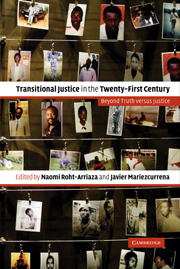Book contents
- Frontmatter
- Contents
- List of contributors
- Acknowledgments
- The new landscape of transitional justice
- Part I Truth, justice, and multiple institutions
- Part II Levels of justice: Local, national and international
- Introduction to Part II
- 7 A new approach to restorative justice – East Timor's Community Reconciliation Processes
- 8 Justice at the grassroots? Gacaca trials in Rwanda
- 9 Bremer's “Gordian Knot”: Transitional justice and the US occupation of Iraq
- 10 Truth, justice and stability in Afghanistan
- 11 The prosecution of Hissène Habré: International accountability, national impunity
- 12 Argentina's contribution to global trends in transitional justice
- 13 Transitional justice: Lessons learned and the road ahead
- Index
9 - Bremer's “Gordian Knot”: Transitional justice and the US occupation of Iraq
Published online by Cambridge University Press: 05 June 2012
- Frontmatter
- Contents
- List of contributors
- Acknowledgments
- The new landscape of transitional justice
- Part I Truth, justice, and multiple institutions
- Part II Levels of justice: Local, national and international
- Introduction to Part II
- 7 A new approach to restorative justice – East Timor's Community Reconciliation Processes
- 8 Justice at the grassroots? Gacaca trials in Rwanda
- 9 Bremer's “Gordian Knot”: Transitional justice and the US occupation of Iraq
- 10 Truth, justice and stability in Afghanistan
- 11 The prosecution of Hissène Habré: International accountability, national impunity
- 12 Argentina's contribution to global trends in transitional justice
- 13 Transitional justice: Lessons learned and the road ahead
- Index
Summary
Shortly after the US invasion and occupation of Iraq, L. Paul Bremer III, in his capacity as the chief administrator of the Coalition Provisional Authority (CPA), introduced several transitional justice mechanisms that set the course for how Iraqis would confront the legacy of past crimes for years to come. In developing these mechanisms, Bremer consulted with a select group of Iraqi exiles that had returned to Iraq or were still living abroad. However, he failed to solicit the opinions and attitudes of the Iraqi people as a whole. He also failed to consult many of the governmental and non-governmental entities that could pass on to the CPA and future Iraqi governments the “lessons learned” and “best practices” gleaned from transitional justice processes in other countries. As a result, many of the mechanisms introduced by Bremer either backfired or were hopelessly flawed.
Introduction
In early March 2003, weeks before the US invasion of Iraq, CIA officials and senior military commanders gathered at Camp Doha, Kuwait to plan for the eventual siege of Baghdad by US and coalition forces. Intelligence officials were convinced that Iraqis would rush to the streets to welcome American soldiers as they rode triumphant into the Iraqi capital. One CIA operative suggested that US special forces and Iraqi sympathizers should sneak hundreds of small American flags into the country for Iraqis to wave at their liberators. The agency would capture the spectacle on film and beam it throughout the Middle East.
- Type
- Chapter
- Information
- Transitional Justice in the Twenty-First CenturyBeyond Truth versus Justice, pp. 229 - 254Publisher: Cambridge University PressPrint publication year: 2006
- 1
- Cited by



